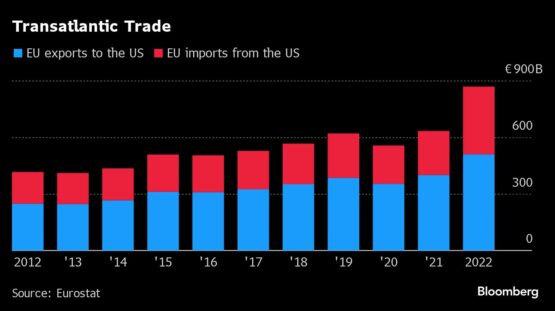The European Union is working on a formal evaluation of what a Donald Trump presidency would look like and is planning how to respond to any punitive trade measures that would hit the bloc if he wins the US election.
The European Commission, the bloc’s executive arm, has started preparing an impact assessment of the consequences of the November ballot, paying particular attention to the scenario in which Trump emerges as the victor, according to an official.
ADVERTISEMENT
CONTINUE READING BELOW
The former president’s style has become increasingly aggressive and it’s generally accepted among the bloc’s member states that another term would see coercive actions like tariffs directed at the EU, according to a senior official familiar with the preparations. The official, who spoke on the condition of anonymity, added that it’s incumbent on countries in the EU to brace for what’s to come.
Trump’s team is planning a potential litany of actions against the EU, which could include a broad minimum 10% tariff as well as possible counter-measures against European digital services taxes that implicitly go after US technology champions, Bloomberg reported earlier Wednesday.
Last time around, Trump shook the foundations of the transatlantic relationship when he attacked the World Trade Organization, questioned European security guarantees and called Brussels a “hellhole.” The presidential hopeful has sailed to victory in the first two Republican primary contests and leads Joe Biden by an average of 6 percentage points in the seven critical swing states that will likely decide the 2024 election, according to a January Bloomberg News/Morning Consult poll.
The two sides are still at odds over tariffs Trump imposed on EU steel and aluminium during his first term as president, citing US national security concerns. The bloc retaliated with countermeasures of its own and in 2021 reached a temporary truce with Biden.
But the EU argues that the current situation is still unfair, saying that the bloc’s exporters pay over $350 million a year in duties. EU member states, however, have been reluctant to respond to the situation by reimposing tariffs on US goods due to concerns that it could help Trump’s election chances.
The potential measures against Europe would serve as a component of a broader initiative to overhaul US trade in goods. The nation has had long-standing, large deficits with the EU, with 2023 marking a third straight year of imbalances exceeding $200 billion — a pattern Trump advisers argue is an illustration of unfair trade practices.
To avoid the transatlantic antagonisms of Trump’s first term, some European officials are taking tentative steps toward a charm offensive. High-level officials including German Foreign Minister Annalena Baerbock have already started reaching out to Republicans. In September, she travelled to Texas and Washington to meet a number of Trump supporters.
Europe must be ready to work with Trump if he wins, she told Bloomberg last year, and it would be “naive” not to prepare for such an outcome.
ADVERTISEMENT
CONTINUE READING BELOW

Annalena Baerbock got behind the bar and served beers during a visit to Back Porch BBQ and Grill In La Grange, Texas. Image: Arne Delfs/Bloomberg
While Biden’s rhetoric may be more conciliatory than Trump’s, and his alignment with the EU over Ukraine has helped to repair the transatlantic relationship, EU officials remain conscious that his trade policy still has much in common with his predecessor’s ‘America First’ approach.
The Europeans were shaken, in particular, by Biden’s $390 billion-plus subsidy program to support green technology, which offers companies an incentive to shift investment from Europe to the US.
Baerbock’s boss German Chancellor Olaf Scholz has said openly that he wants Biden to be reelected. Trump, by contrast, stands for a “great division” in the US — one that would also be bad for Germany, Scholz said last year. “The current president is better, so I want him to be reelected,” he added.
Businesses leaders are also sounding the alarm. Deutsche Boerse AG CEO Theodor Weimer said of a possible return of Trump that Europe can only hope that the US’s legislative system has “strong checks and balances;” as they would be needed.
© 2024 Bloomberg

